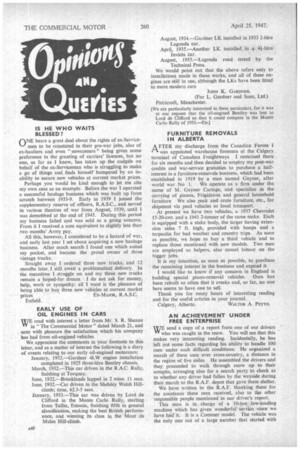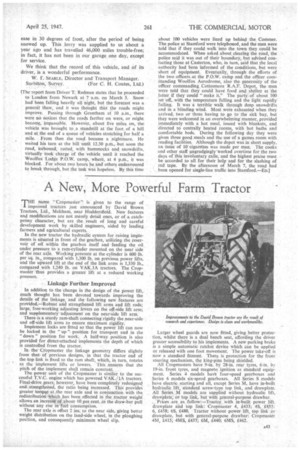AN ACHIEVEMENT UNDER FREE ENTERPRISE
Page 50

Page 53

If you've noticed an error in this article please click here to report it so we can fix it.
WE send a copy of a report from one of our drivers TV who was caught in the snow. You will see that this makes very interesting reading. Incidentally, he has left out some facts regarding his ability to handle 100 men under such difficult conditions. He organized a march of these men over cross-country, a distance in the region of five miles. He assembled the drivers and they proceeded to walk through snow up to their armpits, arranging also for a search party to check as to whether any driver had fallen by the wayside during their march to the R.A.F. depot that gave them shelter.
We have written to the R.A.F. thanking them for the assistance these men received, also to the other responsible people mentioned in our driver's report.
This man is in charge of a 10-ton low-loading machine which has given wonderful -service 'since we have had it. It is a Cornmer model. The vehicle was the only one out of a large timber that started with
ease in 30 degrees of frost, after the period of being snowed up. This lorry was supplied to us about a year ago and has travelled 46,000 miles trouble-free; in fact, it has not been in our garage one day, except for service.
We think that the record of this vehicle, and of its driver, is a wonderful performance.
W. F. SEARLE, Director and Transport Manager.
Surbiton, Surrey. (For C. H. Coates, Ltd.) (The report from Driver T. Redman states that he proceeded to London from Newark at 7 a.m. on March 5. Snow had been falling heavily all night, but the forecast was a general thaw, and it was thought that the roads might improve. Passing through Grantham at 10 a.m., there were no notices that the roads farther on were, or might become, impassable. However, about five miles on, the vehicle was brought to a standstill at the foot of a hill and at the end of a queue of vehicles stretching for half a mile. From then the road became a nightmare. He waited his turn at the hill until 12.30 p.m., but soon the road, icebound, rutted, with hummocks and snowdrifts, virtually took charge of the vehicle until it reached the Woolfox Lodge P.O.W. camp, where, at 4 p.m., it was blocked. For about two hours he and others endeavoured to break through, but the task was hopeless, By this time about 100 vehicles were lined up behind the Cominer. The police at Stamford were telephoned, and the men were told that if they could walk into the town they could be accommodated. When asked about clearing the road, the police said it was out of their boundary, but advised contacting those at Casterton, who, in turn, said that the local authority had been informed of the conditions, but were short of equipment. Eventually, through the efforts of the two officers at the P.O.W. camp and the officer commanding Woolfox Aerodrome, also the generosity a the officer commanding Cottesmore R.A.F. Depot, the men were told that they could have food and .shelter at the latter if they could "make it." The party of about 100 set off, with the temperature falling and the light rapidly failing. It was a terrible walk through deep snowdrifts and in a blinding wind. Most were exhausted when they arrived, two or three having to go to the sick bay, but they were welcomed in an overwhelming manner, provided immediately with a hot meal, issued with blankets, and directed to centrally heated rooms, with hot baths and comfortable beds. During the following day they were given three good meals and the use of a games room with reading facilities. Although the depot was in short supply, an issue of 10 cigarettes was made per man. The cooks and other staff ungrudginglyWorked overtime for the two days of this involuntary exile, and the highest praise must be accorded to all for their help and for the slashing of red tape. By the afternoon of March 7, the road had been opened for single-line traffic into Stamford.—ED.]












































































